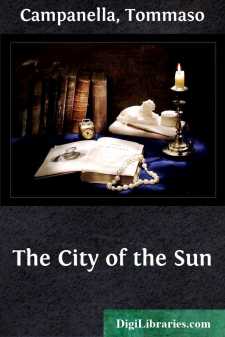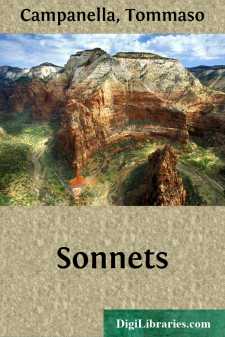Categories
- Antiques & Collectibles 13
- Architecture 36
- Art 48
- Bibles 22
- Biography & Autobiography 813
- Body, Mind & Spirit 142
- Business & Economics 28
- Children's Books 15
- Children's Fiction 12
- Computers 4
- Cooking 94
- Crafts & Hobbies 4
- Drama 346
- Education 46
- Family & Relationships 57
- Fiction 11828
- Games 19
- Gardening 17
- Health & Fitness 34
- History 1377
- House & Home 1
- Humor 147
- Juvenile Fiction 1873
- Juvenile Nonfiction 202
- Language Arts & Disciplines 88
- Law 16
- Literary Collections 686
- Literary Criticism 179
- Mathematics 13
- Medical 41
- Music 40
- Nature 179
- Non-Classifiable 1768
- Performing Arts 7
- Periodicals 1453
- Philosophy 64
- Photography 2
- Poetry 896
- Political Science 203
- Psychology 42
- Reference 154
- Religion 513
- Science 126
- Self-Help 84
- Social Science 81
- Sports & Recreation 34
- Study Aids 3
- Technology & Engineering 59
- Transportation 23
- Travel 463
- True Crime 29
Tommaso Campanella
Tommaso Campanella (1568–1639) was an Italian philosopher, theologian, and poet known for his utopian ideas and radical political theories. His most famous work, "The City of the Sun," envisioned an ideal society governed by reason and communal ownership. Campanella spent much of his life imprisoned by the Spanish Inquisition due to his involvement in anti-Spanish uprisings and his controversial ideas challenging both religious and political authorities. Despite persecution, his writings greatly influenced later Enlightenment thinkers and the development of modern political philosophy.
Author's Books:
Sort by:
A Poetical Dialogue between a Grandmaster of the Knights Hospitallers and a Genoese Sea-Captain, his guest. G.M. Prithee, now, tell me what happened to you during that voyage? Capt. I have already told you how I wandered over the whole earth. In the course of my journeying I came to Taprobane, and was compelled to go ashore at a place, where through fear of the inhabitants I remained in a wood. When I...
more...
I. It is with diffidence that I offer a translation of Michael Angelo's sonnets, for the first time completely rendered into English rhyme, and that I venture on a version of Campanella's philosophical poems. My excuse, if I can plead any for so bold an attempt, may be found in thisвÐâthat, so far as I am aware, no other English writer has dealt with Michael Angelo's verses...
more...



